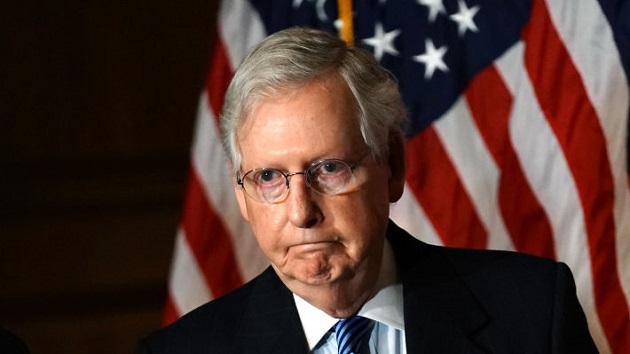
Kevin Dietsch-Pool/Getty Images
Kevin Dietsch-Pool/Getty ImagesBy TRISH TURNER, ABC News
(WASHINGTON) — Sources on both sides of the aisle in the Senate told ABC News that chances for a grand compromise on a COVID-19 relief package are growing dimmer, though some aides to negotiators insist there is still hope.
The major sticking point? A shield against lawsuits for businesses, health care facilities, and schools — a top GOP issue.
Making a compromise even less likely, particularly for Republicans, ABC News has confirmed that Senate Majority Leader Mitch McConnell has signaled through staff that he is not in favor of a $908 billion bipartisan proposal, saying it would not be supported by most in his conference. The news was first reported by Politico.
“My sense is that they’re not going to get there on the liability language,” Sen. John Thune, R-S.D., a top McConnell deputy, told reporters of the compromise. “So my view is that the best thing that could happen is the pieces of this that everybody agrees on, take that out … and pass the rest of it, and I think you’d be at a big — I think you’d probably get 70, 80 votes for the Senate.”
But Democrats have insisted that funding for states and localities is essential to any package, warning that first responders and teachers could be laid off in some states if aid is not approved soon. Some states have indicated that they need federal financial assistance for their coronavirus vaccine distribution efforts.
While negotiators have essentially come to a deal on $160 billion in state and local funding and how to dispense it with strict guidelines, according to a GOP aide and Democratic aide close to the talks, Republicans have insisted that this funding be inseparable from liability reform, an item dear to Republicans. Thune suggested to reporters Thursday night that both items, as a result, be stripped from the compromise for now.
The White House threw another wrench into the talks when earlier this week it offered a $916 billion proposal that included a second round of stimulus checks, this time at $600 rather than $1,200, and reduced unemployment benefits. That set off a debate about whether or not to have a second round of those direct payments, something the $908 billion compromise legislation does not contain.
Sen. Bernie Sanders, I-Vt., took to the floor Thursday threatening to try to hold the Senate in session if he did not get a vote on an amendment to offer another round of $1,200 payments.
Lawmakers had hoped to put any coronavirus deal on a massive, year-end government funding package, but time is running out as 12 million Americans are slated to have their unemployment benefits cut off entirely and scores more are poised to be thrown out of their homes when the federal eviction moratorium expires at year’s end.
But Congress, unable to finish its work on its annual government funding bills, has had to prioritize — at the 11th hour — keeping the government funded as its top priority. And there is fear that the coronavirus aid fight could derail that effort resulting in a government shutdown.
Sen. Roy Blunt, R-Mo., also a member of leadership who has been working closely on that must-pass omnibus government funding bill, told ABC News on Thursday night that he just does not see the deal on coronavirus coming together this year.
“I think it absolutely might not be possible, and it might actually be so diversionary, that it pulls down what appeared to be a likely omnibus bill,” said Blunt.
Months ago, Blunt said nothing ever happens in a lame-duck session. Thursday he said that he hopes Speaker Nancy Pelosi and McConnell will turn their focus on getting the government funding bill across the finish line.
“I would hope that the leader and the speaker spend as much time as they can on getting that done, and then see if there’s any oxygen and energy to add things to it,” Blunt said. “And that’s from somebody who’s believed the whole time, we need another — another COVID bill this year. “
One Republican negotiator said Thursday night that it might be time to call it quits — for now — on both liability protection and state and local funding.
“I think the question I have is, will we say, ‘Hey look, we were successful in getting $908 billion, getting people together to that number. We’ve solved a whole series of elements. Maybe on state and local, the liability (protection), we wait — given the timeframe — until next year, but all the other elements we’ve come to agreement on — everything from broadband, to vaccine, to health care support for hospitals, PPP, unemployment insurance — we’ve laid all these things out. And there are a couple left that may just take more time,” said Sen. Mitt Romney, R-Utah.
“There’s not the urgency to resolve those issues that there is with things like unemployment insurance, help for small businesses vaccine distribution — those things we need right away. The other things, we have the time to deal with,” Romney said.
But one Democratic aide close to the deal emailed ABC News Thursday night, “I really do think if we could just keep our focus on this deal, we could get something done. How can we leave without doing something? We just can’t. We can do this.”
Copyright © 2020, ABC Audio. All rights reserved.